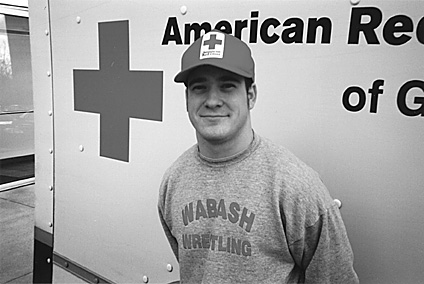
“I’ve seen families after tornadoes looking lost and struggling to understand the forces of the nature. I’ve seen them trying to come to grips with their loss,” Widener says. “But this was unlike anything I’d seen previously.
“I shared with him something we had talked about in C&T—that ‘There is still good in the world stronger than any evil’. Through all of the events of that six-week period, I kept that thought in my mind."
Magazine
Winter/Spring 2002
Speaking of Sports
Opening Eyes

by Brent Harris
Director of Sports Information
Then he found something else that became more important.
Widener’s father, Craig, works for the Red Cross.
“I’ve always been interested in my dad’s job,” Widener explains. “I can remember spending the spring break of my senior year working on the Ohio River loading sand bags on the river bank to help keep the flooding to a minimum. It seemed like we were always traveling to some kind of natural disaster with my dad.”
So the events of September 11 were viewed from a unique perspective in the Widener household; Randy’s father went to New York City to see if he could lend a hand. And when fall semester classes ended, Randy joined his father.
“I’ve seen families after tornadoes looking lost and struggling to understand the forces of the nature. I’ve seen them trying to come to grips with their loss,” Widener says. “But this was unlike anything I’d seen previously. The psyche was different.”
Widener began his volunteer work washing trucks that were leaving Ground Zero. That didn’t last for long.
“The Federal Emergency Management Agency departmental managers figured that, since I was a college student, I could do math and read. They moved me to inventory control at one of the FEMA administrative centers. That was different than any disaster that I had seen.”
“Normally at a disaster site, the most important items coming from the administrative centers are food, water, shelter, and support. This time the order had changed. Support was the most important thing that we could provide to the survivors. They need mental and financial support. This just broke all the rules.”
Working in the administrative offices, hearing the stories of families that had lost loved ones in the tragedy reminded Widener of the way his September 11 started.
“I was asleep in my room when someone called and told me to turn on the television. I went to my senior seminar later that morning after watching an hour or so of the events on TV. Professor Timmerman had us watch the news coverage and discuss what was happening and how it was affecting us personally. I remember I didn’t feel scared, I felt like I needed to do something to help.”
Widener took some time during the six weeks he spent in New York to visit Ground Zero.
“I visited the church near Ground Zero. It’s become a memorial of sorts. There must have been almost 500 people there the day I visited. They were leaving messages of hope, flowers in honor of the victims, and looking at pictures the relatives of the victims had left at the church. Even with all of the people there in downtown New York, it was silent.”
“Everything I was seeing, all of the stories that I had heard finally came together. I cried. I just couldn’t handle it anymore. It was creepy, thinking about the events that had changed all of these lives. Yet, it was so peaceful there.”
Widener came to Wabash because he knew it would prepare him for life. He knows now that it has.
“While I was counting boxes and filling out inventory forms, I thought back to my Cultures & Traditions class. We learned to appreciate other cultures. That came home to me as I met all kinds of people in New York. I worked with a graduate student from Columbia University at the administration building. We talked about how the events had affected us, and how important we both felt it was to be able to help people in the wake of the tragedy. I shared with him something we had talked about in C&T—that ‘There is still good in the world stronger than any evil’. Through all of the events of that six-week period, I kept that thought in my mind.”
“The experience opened my eyes. I discovered that little things matter. Just a friendly ‘thanks’ from someone could bring a smile to my face. Little acts of kindness matter. I had heard those statements from my parents, my teachers and professors, but until I came to see it for myself, they were just words. Now I know what those words mean.”
Before his semester break experience at Ground Zero, Widener had planned to become a teacher and to coach wrestling, a sport that has meant everything to him. Those plans have changed.
“I’ve always wanted to teach and I love wrestling. Wrestling teaches you to respect your coach, your opponent, and yourself. I wanted to combine those two and make them part of my future.”
“Now I know that I can still do those things, but I can use them to help people. I can teach others by working through Americorp, the Red Cross, or FEMA. I can still be involved in wrestling. But the bottom line is helping others. That’s what brings the most joy to me, and I’ve now seen first hand the joy it can bring to someone else.”
Return to the table of contents
